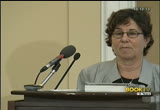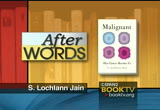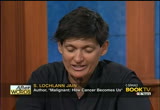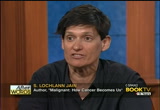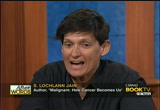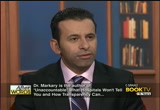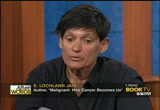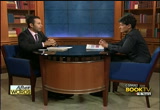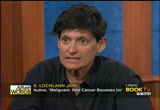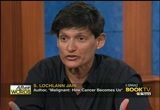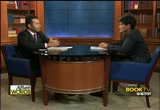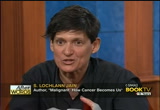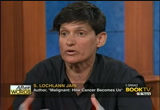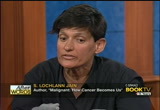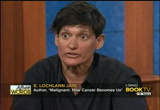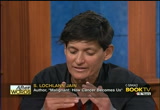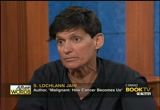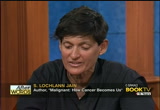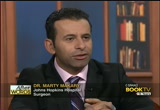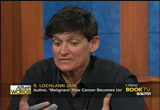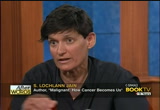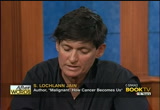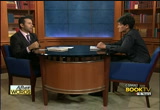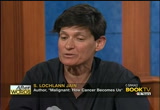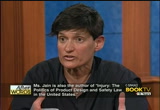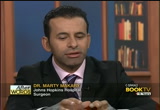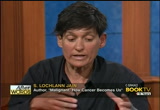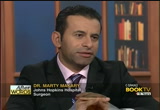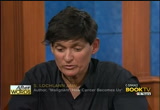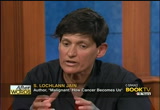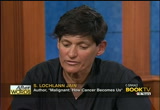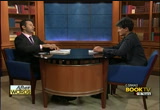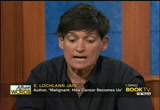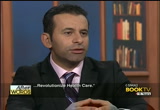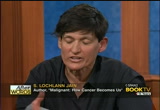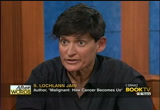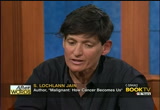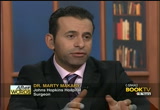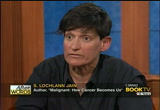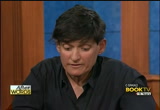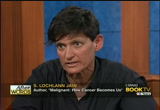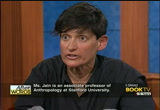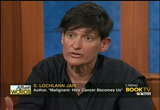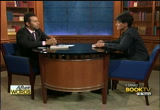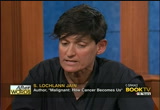tv After Words CSPAN November 3, 2013 9:10pm-9:56pm EST
9:10 pm
[applause] up next on book tv, "after words" with a guest host dr. marty makary. this week, s. lochlann jain and her first book, "malignant: how cancer becomes us." and at the for cancer patient explores the economic impact of cancer on american society and discovers that it's not in the financial interest of the country to find a cure.
9:11 pm
ms. jain argues each patient generates millions of dollars in revenue for the health care industry and other industries benefit from the high incidences of the disease as well. the program is about an hour. >> host: rn with dr. s. lochlann jain a professor of anthropology at stanford university and it's great to be here with you talking about your new book, "malignant: how cancer becomes us." >> guest: thank you very much. it's a pleasure to be here. >> host: how did you get the idea to write a book like this? there are so many people with opinions about cancer, the culture, the ethics of how we deliver cancer care. how did you get interested in the subject? >> guest: i've been interested for a long time. i wrote about cigarettes in my first book, but i never thought to write an entire book on cancer until i was diagnosed at a relatively young age at 36, and i was astonished at how
9:12 pm
different i thought it was, how different it was going through treatment than what i have heard about cancer or what i expected cancer to be. i sort of expected it kind of well oiled machine in which care wasn't obviously guaranteed about people knew about my particular cancer, i would be followed and what i found was something really different. and so i couldn't help. when you go to the doctor getting the diagnosis there was an awkward moment there. tell me a little bit about that incident. >> there were a few awkward moments about my diagnosis to read the doctor that diagnosed me with a medical professor of my mother's and she had been in a medical school class who had petitioned against these slides
9:13 pm
unfortunately that he was the one who was my surgeon and had done quite a bit of research. i had done a lot of research on my own and kaine with a stack of a bunch of questions and i was particularly interested in the prognosis to it so this chart as the number of years you are expected to live. so i gave them this number and i said what does this mean? he said it means exactly what it says. that was a confusing moment for me because it gave me the number and what i wanted the chart to tell me is whether i would be alive or dead in five years if i would have a recurrence or not. how to plan my life, but they
9:14 pm
gave me a number and i just became incredibly intrigued by these numbers and how they actually influenced very much what cancer is. it's a little about the actual fighting cells than about the infrastructure's through which we know cancer. >> host: how did we get to be such a number centered statistical profession where our communication with patience is similar to our communication with cleaves. i'm a cancer surgeon and when i talk to recall the good of a patient, it should be different than the way that i talked to the patient. we are talking about a different scientific level, technical level, staging level. patient some sometimes need assurance and to be told the truth but in a way that's -- what did you need at that moment? >> guest: i feel like an ounce patient we commended this place
9:15 pm
we don't know what our role is. i certainly have never been a patient before. i didn't know what i could expect of the doctor to get some i've spoken to say that they haven't been -- don't feel well enough trained to talk to patients so there are a lot of different things running around with it can feel like for the patient in that space you have ten minutes to ask all the questions that you might possibly have. so that is a really interesting question. i think the part about numbers is the idea that members of by the treatment is a relatively new one today instead of doing trials on populations the only thing about the 1940's and 1950's. so before that metaphor, historians have pointed out that
9:16 pm
the role of the patience body to give much greater standing in the process and the diagnosis. there is much less about tests and where people fit into the categories. but more about how the body spoke to us and how they themselves articulate the issues with them. and i think that we may have come to a place in which the numbers have started to do too much work in the diagnostic process. >> host: it seems like it is difficult to deliver bad news when you are a doctor and sort of the fullback is to just cling on to the statistics and talk about the next test or studied that you need to get done and focus on the chance of everything being great. is very little bit of a denial that he think of the reality the way the body is and the way our
9:17 pm
lives are limited? >> guest: i think there is a pressure to focus and i think that is absolutely true from a medical side of things and also a culture of focusing on the positive part especially around cancer i think about the spokes people like lance armstrong who really for grounded his own agency in finding the right doctor and finding the right treatment and surviving and i think that's a story that we all want to believe and. but the truth of the matter is it's not the case and a lot of people that i've talked to that have advanced cancer and not even such advanced feel like their experience is being denied and they are not being seen and their struggles aren't being seen and i think those may get a
9:18 pm
lot harder for people than it needs to be because you can retain hope even hope against hope while also acknowledging that this is really going to be a problem. >> host: what is it like as a cancer patient? you are an extremely accomplished researcher at stanford but just for a moment thinking about this as a patient what is it like hearing of the militaristic information around cancer? is that helpful to make things clear to patient squawks is a destructive because it economizes something that shouldn't be dichotomized? share your thoughts on that. >> guest: that is such an interesting question because precisely because so -- the keen cancer treatment therapy is mediation and military base. we have chemotherapy stemming from world war i technology that
9:19 pm
was designed on the killing field and suddenly it was found that the soldiers lymph systems were basically melting and that this might be a potential treatment for cancer. similarly with the radiation. there had been an exploration of radiation before world war ii, but after world war ii radiation was understood to be terrifying technology of world war ii into more friendly hands. >> host: you are saying chemicals and radiation were used in warfare and then they saw the effect on the body and thought maybe we can use this against cancer? is that where we get the language from? the war on cancer, fighting, winning and losing? where does that come from? >> guest: that's a really good question. it could be one of the places we get that.
9:20 pm
i'm not as interested in tracing the history of the language as in mid the effect of that language so i think in one sense the way the we specify cancer to say we are going to have a war on cancer and eradicate cancer it presumes that we know what it is to read that there is something out there that we can see and we can kill and it couldn't be further from the truth in several ways one of them as cancer is being produced around us all the time. we know that by having our plastics and the things that make our lives easier are also producing certain members of cancers and so it's hard to say we are going to kill but when we are also producing did at the same time. host could you think the research community is keeping up with all of the cancer causing agents out there in the world?
9:21 pm
is it even possible to study some of these things that come to the market so fast? i would think some of these have a ten or 20 year affect on the human body yet they come to market as fast as the marketplace is ready to adopt them. >> guest: i think that's true. we don't even have the tools at our disposal to know how to study a lot of these and most products are not studied for their carcinogenic potential. so a lot of what we have his suggestions. we know that certain high doses of things will cause cancer. we haven't been able to study low doses as well and so what we get is this area of fear and uncertainty and that has had a huge impact on how people understand cancer but it's often an unspoken sort of impact. >> host: when people were asked what they fear the most in life, death from cancer is always of the top of the list along with blindness.
9:22 pm
what do you think are the real drivers of cancer in the ten broad categories of behavioral, environmental i think of states like west virginia where we know there's a lot of pollution from the mining industry, very high rates of pancreas cancer and of lymphoma leukemia. i grew up in central pennsylvania in a coal mining area, high rates of certain leukemia and lymphoma. do you think we appreciate some of these environmental factors and what is control of the environment? >> guest: i mean, i think phil role of environment is very controversial. it's extremely high particularly for some of the cancers that have been directly related to environmental toxins. i think one of the issues here is there are very few safety nets. one of the reasons i was originally interested in cancer in my first book was that in some of the ways we have to understand and be compensated
9:23 pm
for our injuries in terms of faulty designs or somebody doing something that has injured us are not able to see cancer in a way so you have to be able to prove to be delayed could bring a lawsuit and a proximate cause. what if you are being injured 30 years down the line and there is no research that shows any concrete way that this chemical has given you this cancer it is impossible to bring a lawsuit and so there's very little way to make the companies responsible for the injuries they may be causing and there are huge financial disincentives to doing that kind of research so it's difficult to do that very expensive kind of research. >> host: there was a study that said the fall of the clinical trials the percent that
9:24 pm
are introducing a drug that is superior to what is already out there is 4% from 4% of clinical trials yield a drug that is superior. do you think there is a false hope that we share about the promise of clinical trials? we need them. bless the clinical trials that we've got. tell us about this perception of the promise of cancer, the hope for a cure and promise for massive achievements in the short term, is a goal or a reality? where do we stand? >> guest: that is a bind because you to have them we need people to enroll in them and part of the problem with cancer and their research is the result, the improvements are so small that we have huge numbers of people that enroll. i've had physicians tell me if
9:25 pm
it works with just a few people you give them the treatment and they are better but if the treatment only slightly works are only for some people you need to have huge numbers of people signing up in a trial and to do that it's very easy to kind of own the promise and i think that as patients in this they find where they have to sign up for something in which they have virtually no hope of actually taking part so that is one of the things that also sets up this juncture between being a patient whose body is laying down in the service of scientific research and often because of the for-profit medical system and patience are leading their body down and the profits of other people and it's very problematic for how we understand cancer more generally, absolutely. >> host: so, let's say you are
9:26 pm
a patient and you are offered a clinical trial and there is a 50% chance he may get the placebo, a tel that does nothing, versus the studied medication. what if you get the placebo but it turns out midway or at the end of the tribelets discovered the other medication is superior and has a big benefit, then what? >> guest: often times to get the drug you have to wait for fda approval which can take years depending on which part of the trial you are a part of. it's a tough question. everybody has to make that call for themselves and it's of course very difficult to get information on side effects and how you will be treated once you join the system in terms of having the side effects address or any long term affects of the treatment which are often not
9:27 pm
known. that's a tough question. >> host: if you get to the lesser of the two medications in the trial, you can't just get the superior one immediately afterwards. you have to wait for regulatory approval in a period of time. >> guest: in those cases, yes. >> host: tell me a little bit about the problem of the publication by es. when we have a good research study on madison, the results are really impressive, it goes into the medical literature and it becomes a standard that patients are told about but there might be five for ten other studies that show no benefit and it's only the one that does show the benefits that makes it to this spot light. what is the impact of the publication of these sort of academic by a cs? you're a professor in the academic world. >> guest: it's interesting to
9:28 pm
trace the study's backed and find which cases become the substandard for which kind of evidence, and i've sometimes found i will trace something back that i found that had merely taken for granted truism and found that actually the initial study from which it is based is a very local study or one that at times are very controversial and sometimes those controversies seem to have dropped out. that's part of the scientific project. i think that happens in the making of all kinds of different science. you have certain contestations over something had a certain point. it becomes resolved one way or another and not always in a way that's necessarily the best practice or the way that you would expect triet >> host: how much over treatment is going on in the field of cancer care in america?
9:29 pm
>> guest: that is a tough question right now because you could say often the over treatment is something that we see people with early stage cancer who say have breast cancer for rick symbol have been in the news a lot recently to the if you have an early stage, then staged one cancer and then who had mastectomies and maybe some chemotherapy some people say that's over treatment. other people say that's not over treatment because we don't know which cancers will metastasize and we don't know which ones won't so as a consequence, we treat everybody. you could say that everybody has had chemotherapy has been over treated even if the had a late stage cancer because it works with relatively few patients and the ferias we will give it to everybody in the hope that there will work for. so the over treatment sometimes
9:30 pm
can neglect to account for how much is known about a particular cancer. similarly, if you look at which hospitals people go to that has a huge effect on what kind of treatment is there are sometimes people will be encouraged to have mastectomies or more surgery where other places will be encouraged to have less or even more so definitely what kind of advice as well as their own personal history and years and in the understandings of fact what kind of treatment they will get. >> host: our patients given all their options or are they sort of under explain all the different options when it comes to cancer care sometimes cracks >> guest: i think sometimes because a lot of the surgery is covered by insurance there may be some interest in overselling
9:31 pm
the potential for surgery. i spoke to several people who wanted, for example, just one mastectomy and then one reconstruction and they were encouraged by their surgeon to have a double mastectomy and double reconstruction because a would be more even, they could have a body they were happier with and the end up being quite disappointed in the surgery is or that they were not offered the option to have no reconstruction at all so i think that there are some occasions in which it is oversold little bit. >> host: it seems like when we talk about cancer care -- and in your book you emphasize that there are so many things out there to treat cancer it's not just chemotherapy. there is support we have learned from research studies that your attitude and in your approach and your support network there is a study very recently that showed folks that are married when they are diagnosed with
9:32 pm
cancer can do better than those that are not married maybe it's because there's someone there, a champion or advocate. you tend to think of cancer care ask the chemotherapy. how should we be thinking about it? >> guest: that's a great question. one, i think it is absolutely critical that anybody in the medical system has an advocate and have somebody with them and an extra pair of eyes. >> host: did you have one? >> guest: i did i had a couple. i think that can also backfire a little bit because a lot of times people have cancer against which there just are not great treatments and so it's easy for someone to absorb the long message about they should have a better attitude. they should be doing more. they should have been happier. i met people in retreat i attended who said, you know, understand but i just didn't
9:33 pm
laugh enough and that is why i have terrible ovarian cancer. it's heartbreaking to hear these stories about people who take on personal blame for something that's so far beyond. >> host: they feel guilty when you tell them to get cancer and they say i know i shouldn't have done that when i was a kid. >> guest: yes. even without the guilt, the disease i still think has a lot of shame attached to it and i think that is definitely part of the reason. they have a long history learning about the dimunation that people with a disease i think probably a lot of that had funding going towards cancer research, doctors who chose to the cancer researchers in the first half of the 20th century when it wasn't a very respected field. it's on the 1970's and 80's that it come out of the closet as it were that you could come out and
9:34 pm
be a cancer survivor or have had cancer or to a certain extent have cancer and it was okay. >> host: this field wasn't very lucrative for doctors in the past and now it's very lucrative especially for hospitals and fusion services, the markup on chemotherapy drugs is there is a huge commercial enterprise. i thought as i was reading your book "malignant" of the students that choose to given to cancer care these are some of the most altruistic well-meaning saints of our society. they want to help people and they go through an intense training in a culture of its own and they come out with their own values and vocabulary to describe the same condition that they went to try to improve. what do you see out there when you look at the current state of
9:35 pm
cancer care in america? >> guest: you're absolutely right that to even be attracted to that kind of work requires so much will power and willingness to work to take on the hard issues of our time. but you're absolutely right that the financial incentives are skewed in ways that don't always lead to the best kind of care even from research so we talked a little bit about randomized control. one of the problems is that cancer, even one single kind there may be many different kind of diseases yet when we call it one disease we give everybody the same kind of treatment. we need a lot of different people to join the randomized controlled trial so the and in a population that doesn't have so much adversity and its results.
9:36 pm
so, the pharmaceutical company that wants to design that trial once the drug to be given to the broadest possible category of people. sometimes they will be given for years before it is found that actually if the drug had been tested on a smaller number of people and well-defined and, then in fact a small category of patients but not the fast majority of patients who had been given that treatment so there is an example of a place where the financial benefits of giving everybody the same treatment don't really work in the interest of >> host: we spend a lot of money on cancer research and fund-raising and god bless all the people out there during marathon and leases and fund raising.
9:37 pm
we need all of that. but as a researcher -- and you're very accomplished. i noticed over 400 preferences in your book. you are an academic and i am sure that your standards for a professor are very high. tell us from your research and shoot very straight how are we doing with cancer? how are we doing with advancing the field clacks a recent paper at the meeting which is the big meeting of medical doctors interested in oncology, the top paper of the meeting found that a medication that has already been around applied to brain cancer may increase survival by a few months. the was the top people up the meeting. how are we doing it? >> guest: your interest in how we are doing if we are talking about people making money off cancer we are doing really well, pretty well i would say, if we
9:38 pm
are talking about interest in the number of trials that cancer related, we are doing well. if we are talking about increasing awareness about the disease, i think we are doing fairly well. if we are talking about people's involvement in cancer with marches and bicycle rides and so on i think you're doing well to get when it comes to actually caring cancer and making it less of discourage i think that's because we are not looking seriously at the causes of cancer or putting the resources there. we are not acknowledging how little we know and how that affect their research directions and we are not looking seriously at how much money is made and how that skews the research.
9:39 pm
>> host: some of my family is there with -- patients are there with no family and you have those that are not interested. they drop off their family member of the hospital and aren't really there and for that person. other times there is tremendous family support and it actually warms your heart. what is the role of the families when it comes to cancer? >> guest: i think it is difficult for the family and the role of the caretaker is not well understood. the caretaker is not only there to help but there are psychological needs and their needs to be a lot more research and resources for those people. i think it's hard for them to see a loved one going through a situation that sometimes they can't feel they are doing enough. it's very difficult to talk about these things in realistic
9:40 pm
ways. so i think that's important for the patient to have as i mentioned an advocate but also, cancer treatment can be assertive debilitating. you can't be as active as you want to in your own care committing yourself to the hospital. so i think that those rules are tremendously important and often understated. >> host: dr. jain, you've done so much research in this field of the culture and society around cancer care in america, the industries, the patient, the
9:41 pm
consumers, the profiteers. are there marketplace predators when it comes to cancer, and how much of an industry is cancer care? >> guest: part of what i'm trying to point out in the book is there is a lot of ill happening in the cancer complex and it's not necessarily intended. something for example, pharmaceuticals. their aim isn't to cure cancer it is to make money. we can't blame them for trying to make money even at the expense of perhaps not having the best kind of cancer research and and similarly something like vitamin supplements, the fda doesn't have control over these things and often people with cancer or terminal diseases will
9:42 pm
do anything they can. they are vulnerable and people know that. when they are setting up the price and you have the vitamin c manufacturers that know that when they try to say that a dose of vitamin c will improve your life chances. so unfortunately i would say there is a significant amount of profit happening and people are most vulnerable. >> host: you hear of people spending a tremendous amount amount of money on a vitamin line or some product that gives promise of a good outcome. what is it like to be in that situation when you are told your life is going great and all of a sudden you are told you have cancer. what starts coming through your mind?
9:43 pm
>> guest: you hear vitamin c might help. why not try it? unfortunately, a lot of patience find themselves in a situation where they rack up a large amount of debt and it isn't because they went out to buy a lot of medical vitamin c but the deaths are tremendous for cancer patients. around 47% of the patients and getting a call from the collection agency trying to collect on their bill. >> host: half of all cancer patients will get calls from collection agencies. >> guest: exactly. it's a very expensive diseases and inexpensive disease for people and families, for children whose parents have to take disability. it is a generational disease. >> host: you say it's still fun number one cause of house of bankruptcy in the united states. how do people get in that
9:44 pm
situation? what about insurance? >> guest: many insurance policies have caps and cancer treatment can easily go over a one or a two million-dollar cap. often people don't know what those are before they are in a situation which it is too late. often copayments are a significant 20 or 40% of treatment. >> host: 20 to 40% so a 10,000 were treatment they may spend $4,000 of their own. >> guest: exactly. >> host: lifetime caps are supposed to be eliminated in the affordable care act. what are the still real world costs of cancer patients incur cracks there is the doctor's visit and the infusion. >> host: there's time taken off work, the children still need clothing and tuition and so on. there are these kind of vitamin
9:45 pm
supplements we are talking about, just the daily life wild and disability payments maybe 60% and unfortunately for many people they need 100% just to get by. >> guest: so folks save or don't save you say that about half of all americans will get a cancer diagnosis and we are not talking about a small skin cancer. invasive cancer. our people in general prepared for that time in their life cracks? >> guest: part of the problem that we are dealing with in this country is that people's savings when they have them are tied up in the market and as we know from the housing bible and so
9:46 pm
on, we can't count on that for signs of trouble in the same way that we should have because people with pensions or social security systems and so on so a lot of it is based on timing and luck and what is sometimes referred to as casino capitalism. so even with the best intentions it's very hard to absolutely plan for a period of like this. >> host: one of the famous figures who tried alternative treatments later described regrets about it. do you see people exposed to things that could increase their risk and later had regrets about it? you talk a lot about treatment for infertility. there is a cancer risk there that many patients are not properly informed of? >> guest: i have a chapter on
9:47 pm
that in this book because i'm particularly interested in the question. ivs is a treatment that unfortunately the industry has relied on donors to increase the pregnancy rate enough to make the industry really worthwhile. so pregnancy rates hover at a relatively small amount. i mean if you go and have this your only about 30% likely to get pregnant. and a lot of people who can afford these treatments who often are $20,000 or so are a little bit after the age of their fertility so late thirties or early forties when they decide that they have saved enough even to have their own children and they depend on younger women to be the donors. now there is a chance and not
9:48 pm
much research has been done in this area which makes it such an interesting example for what we do when we don't know what causes cancer that these hormones have a link to cancer several years after they are taken. and this isn't often acknowledged by clinics when they try to get donors. >> host: so you want to get pregnant, you go to a clinic, they tell you, you signed up and spend the money and you say sometimes people have no idea they are not even informed of the increased cancer risk from the hormone treatment? >> guest: that's right. >> host: how prevalent is that? do you think that many people are under told the risk of cancer in this treatment than other conditions? >> guest: barry often this idea that there hasn't been any scientific research kind of becomes articulated as we have
9:49 pm
no proof that it causes cancer. >> host: so the lack of research gets interpreted as there is no risk. >> guest: exactly. >> host: so common sense and wisdom and statistics may show that's not clear? >> guest: its been since the early 20th century. we know that there is a very close link between exogenous hormones and cancer and in this particular case the research has not been done to say these hormones given in this particular way in these doses have a causal link to cancer that we do know that in the amount of medical common sense that other kinds of very similar hormones have resulted in various kinds of cancers. >> host: the number one cause of death using statistics is heart disease. number two is cancer, number
9:50 pm
three is medical mistakes and that is using the estimate of the number of medical mistakes inserted into the ranking list of the cdc put out. you talk about both number three and medical mistakes in the same context. tell me a little bit about your research on the subject of medical mistakes in the field of cancer. >> guest: i was interested in the misdiagnoses. as the adult ai was misdiagnosed for a couple of years and when one first finds that out if you need to take it personally or if it is a result of the ability to communicate with the doctor. >> guest: >> host: did you have a suspicion something wasn't right and you had something?
9:51 pm
>> guest: that's where i went, exactly. and i found out that young adults or adults but in the ages of 20 to 39 are very often misdiagnosed and that is because it is misunderstood by many physicians and the disease of older adults and the fact that there is no screening for younger adults. so i learned that actually about three-quarters of cancers in young adults are caught at the very late stages. now, this i thought was a problem and i was interested in talking to the adults that had been diagnosed late to find out why that was and if anything could be done about and one of the problems they faced being diagnosed and the specific burdens they faced as young adults would be one that only older adults face.
9:52 pm
it's true that it's only second on the list of cause of death but for many demographics its first and one of those is women under 40. >> host: what do you think the next steps are in making progress, really advancing the science and offering things that are more promising? it's clear that we have plateaued with certain treatments. there have been very little advancements and achievements over the last 20 years. as a matter of fact the prognosis today is similar to the prognosis 20 years ago and other fields like childhood leukemia, a disease that work in terrible are now in terrible and it's amazing that the advances. what can we do? some people have talked about the structure struggle by which the research is performed and
9:53 pm
the face barriers and the funding mechanism is set up and you talk about the drivers of research funding in the united states. tell me about your ideas from the research on restructuring the whole approach. >> guest: i think that is an interesting question. one of the things i feel strongly about is that research needs to be more targeted towards specific kinds of cancers. so it seems clear that one of the reasons that adults have had survival increases is because research is constantly being done on older adults and given to number adults as if it is a transferable. so i think one of the things that could be done is thinking about smaller populations. again that goes against all the economic interest in cancer research. one of the things i'm trying to
9:54 pm
point out in this book is all of the different paradox is that happening and that happen when we think about cancer as one solid thing. so particularly curious in thinking about how all of these paradoxes leave out positions for cancer patients are very unlevel but it's very difficult to understand to get back to what we talked about in the beginning a prognosis and what it is to live inside that space of uncertainty where you have no money to save for retirement and you really don't know what that number means and what your chances are. so very interested in how we have to live in these paradoxes. >> host: it seems when people were given a diagnosis everything goes through their mind and there is almost a psychological trauma in addition to all the treatments that someone has to undergo.
9:55 pm
they are full of anxiety about what am i going to do about this plan i had four next year or school or talking to my significant other about this or do i tell people or come out and openly talk about what i went through or do i keep it private because the stigma cracks that something you've wrestled with and i love this book how cancer becomes us because you are very honest about what it's like and as an accomplished researcher coming you do in extensive body of literature research on the industry a around it. you decided to talk openly and honestly. >> host: >> guest: it was a dilemma because of the tremendous amount of shame that i felt and being diagnosed and the kind of incomprehension i had. when i started writing
80 Views
IN COLLECTIONS
CSPAN2 Television Archive
Television Archive  Television Archive News Search Service
Television Archive News Search Service 
Uploaded by TV Archive on

 Live Music Archive
Live Music Archive Librivox Free Audio
Librivox Free Audio Metropolitan Museum
Metropolitan Museum Cleveland Museum of Art
Cleveland Museum of Art Internet Arcade
Internet Arcade Console Living Room
Console Living Room Books to Borrow
Books to Borrow Open Library
Open Library TV News
TV News Understanding 9/11
Understanding 9/11